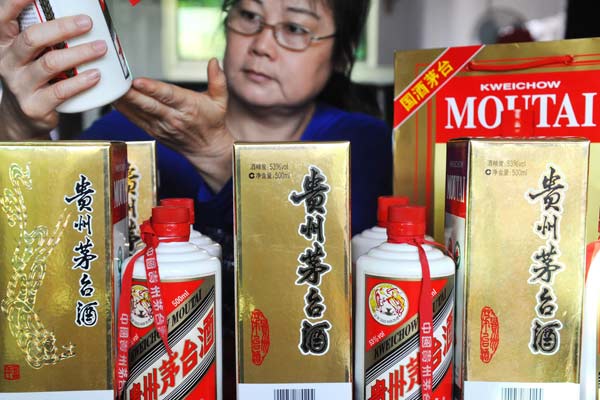 |
|
A liquor store that sells Moutai in Qionghai, Hainan province, in February. The price of the luxury liquor brand has slumped since the country's new leadership launched a campaign targeting government spending on official receptions, vehicle purchasing and overseas trips by civil servants early this year. Meng Zhongde / for China Daily
|
Despite the promising future, the austerity campaign has already hurt many high-end sectors.
The luxury watch trade had enjoyed a banner year in 2011, with a growth rate of more than 40 percent, largely due to the strong demand from China.
But due to the recent austerity, watch exports to China recorded the weakest growth of 0.6 percent, according to data provided by the Federation of the Swiss Watch Industry.
While experts admit the recent measures have had an impact on overall luxury watch sales, data from the Hurun Chinese Luxury Consumer Survey 2013 indicate that luxury watches are slowly losing their appeal as business or personal gifts among China's millionaires.
The latest report, based on a survey of 551 Chinese mainland millionaires with a personal net worth in excess of 10 million yuan, shows Longines is the only Swiss luxury watch brand on the list, ranked 15th, ahead of the more expensive Rolex, which fell out of top 10 for the first time in nine years.
Rupert Hoogewerf, founder and chief researcher of the Hurun Report, the leading luxury publishing and events group in Shanghai, said there is a very strong gift culture in China, predominately in business, because offering expensive gifts makes people feel that they are special in your eyes.
"But with the new government regulation on corruption, people are more careful about what kind of gift they want to give.
"The gift market in China has become more normalized and now that people are aware of that, it is inappropriate to give expensive gifts," said Hoogewerf, adding there is a clear trend toward giving more modestly priced luxury goods this year.
Apart from the government crackdown, increasing scrutiny among Chinese people, who go to social media to check the actions of government officials, has also played a big role in the reduced demand.
The much-publicized case of Yang Dacai, the former head of the work safety administration in Shaanxi province, is a case in point.
Netizens had discovered through online photos that Yang had in his possession several expensive watches costing much more than his earnings. He was later investigated and removed from office.
Hoogewerf said the anti-graft campaign is only part of the reason that people are shifting to modestly-priced luxury goods, such as a 10,000 yuan Longines watch, rather than a 60,000 yuan Rolex watch.
He said he believes the slowing Chinese economy is also partially responsible for the sluggish luxury consumption.
"The economic downturn and the lack of confidence in recovery has also triggered doubts," Hoogewerf added.
